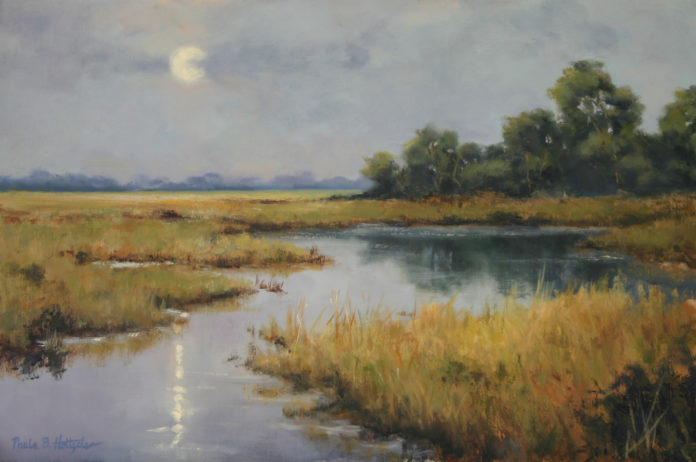
Contemporary Paintings > Artist Paula Holtzclaw has spent a lifetime learning to embrace the vibrancy of inspiration, which has itself shaped the course of her life. Here’s how.

Following the Vibrancy: Contemporary Paintings by Paula Holtzclaw
BY CHARLES RASKOB ROBINSON
Right up front, the painter Paula Holtzclaw (b. 1954) confesses, “I usually dive into my canvas. I start out with my intent, and sometimes I carry it all the way through. But sometimes the painting begins to sail away from its charted course; I have to recognize the inspiration and go with it.” Occasionally this inspiration — what Holtzclaw calls “vibrancy” — is apparent, but at other times it takes a while to discern. Holtzclaw has spent a lifetime learning to embrace the vibrancy, which has itself shaped the course of her life.
Born in North Carolina, Holtzclaw was exposed to art as a youngster through her grandmothers, both of whom painted. She still recalls the smell of art materials as they introduced her to the basics of drawing and painting. Holtzclaw remained interested in art, but life took her in other directions before she returned to it.
In 1972 she enrolled at Western Carolina University, but she married two years later and began working for a contact lens company in its Charlotte laboratory. In 1978 Holtzclaw gave birth to twin boys. When they entered preschool, she joined a large ophthalmology group as a contact lens specialist engaging directly with patients — a welcome change from the solitary work she had pursued in the lab. This preference for being with others would resurface later in her artistic career.
Behind Holtzclaw’s soft-spoken Southern charm is a keen competitiveness. “I have always found myself striving for higher goals,” she explains. “I often ask myself, ‘Why can’t I just relax and enjoy where I am, instead of always reaching for more?’”
For instance, while in her thirties raising twin boys and holding down a professional job, Holtzclaw was introduced to the world of tennis. “I became totally consumed. Not content with just playing for fun, I begged games off the best players available. I played on every team and in every tournament I could. Ultimately I captained a United States Tennis Association team and we made it to the state finals for seven years in a row.”
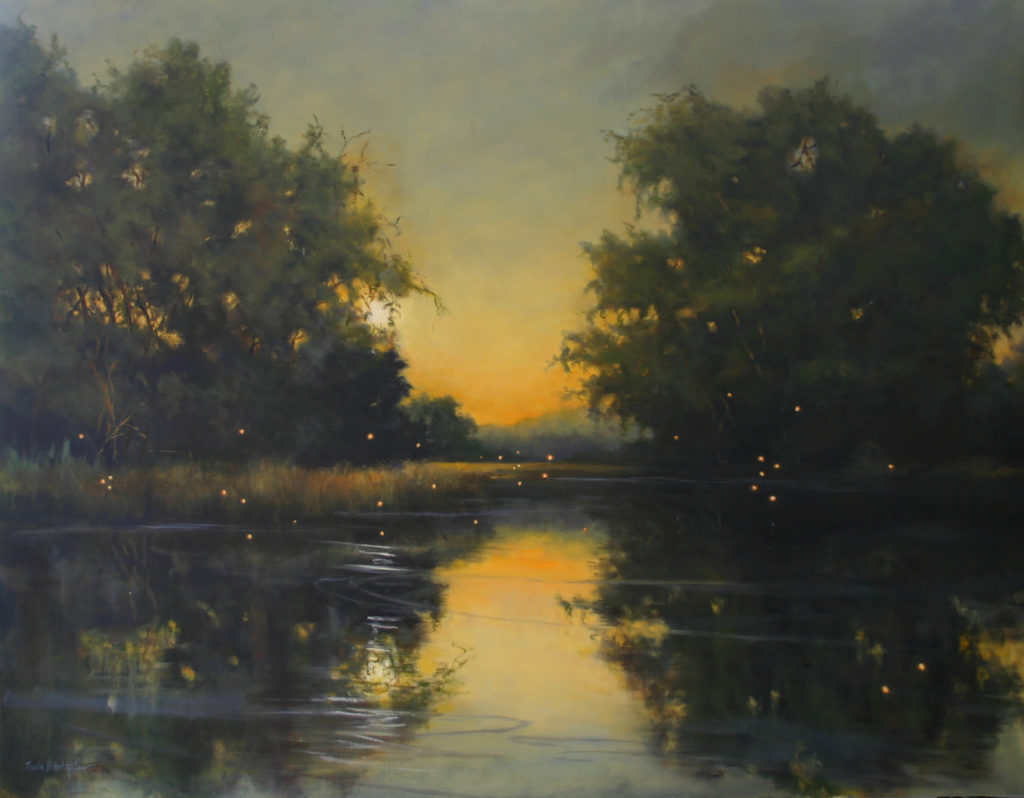
RECONNECTING WITH ART
In the 1990s, recently divorced and still working in ophthalmology, Holtzclaw began to paint again. The vibrancy had reappeared. “I felt like I was coming full circle and had finally found my calling. I became totally obsessed with painting and gave up tennis. I would paint and study art books after work until midnight and as much on the weekends as I could.” In 1996 she landed her first representation, at Charlotte’s Providence Gallery, which still carries her work today. She also works with galleries in South Carolina, Georgia, Florida, and New Jersey.
In 2001, the artist met Chuck Holtzclaw, a certified master arborist who owns a tree-care business. “With much support from Chuck, I left ophthalmology in 2002 to pursue painting full-time. We married the next year and I have never looked back. It’s amazing how fulfilling my new career has been.”
The newlyweds moved to Waxhaw, a quiet town 30 miles south of bustling Charlotte. Holtzclaw had to cope not only with the change of pace, but also with the shift from her people-oriented corporate career to the solitary life of art-making. Sparked by her competitive drive, she decided to learn more about the people and institutions of her new profession.
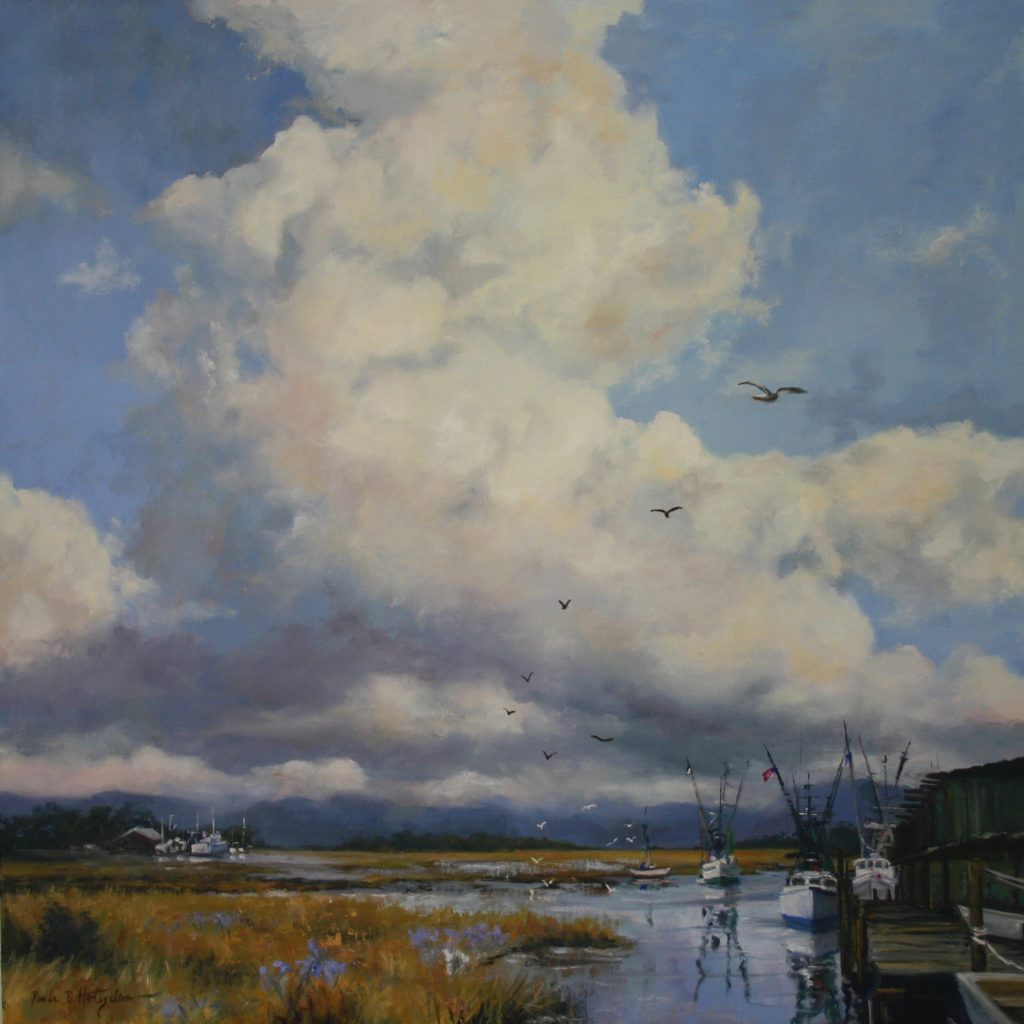
Not surprisingly, Holtzclaw was successful and soon surrounded herself with a new community of valued colleagues. Today she is an active member of many professional organizations, including the American Impressionist Society, American Society of Marine Artists, American Women Artists, California Art Club, Oil Painters of America, Plein Air Painters of the Southeast, Salmagundi Club of New York, and Women Artists of the West.
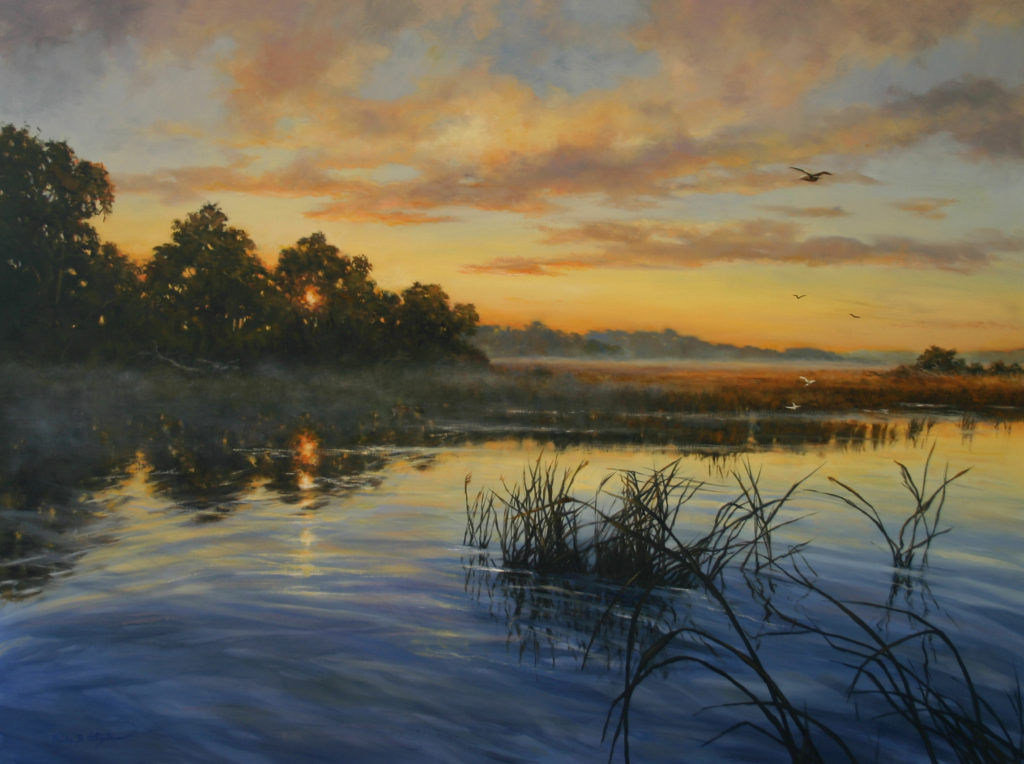
Her artistic career has brought Holtzclaw numerous awards, but her real prize has been meeting other artists and engaging in the field’s organizations. She has been particularly active as a board member of American Women Artists (AWA), which, since its inaugural exhibition at the Tucson Museum of Art in 1990, has highlighted the fact that more than half of America’s working artists are female, yet less than 5 percent of our museums’ holdings were created by women. Less than 14 percent of working women artists are represented in top galleries, and not one of the 10 highest-selling artworks at auction was made by a woman.
In response to this situation, AWA has set a goal to hold 25 exhibitions at museums in the next 25 years. This initiative is already underway through shows that have occurred, or been scheduled, at the Tucson Desert Art Museum, Rockwell Museum (Corning, New York), Haggin Museum (Stockton, California), Steamboat Art Museum (Colorado), and Booth Western Art Museum (Cartersville, Georgia).
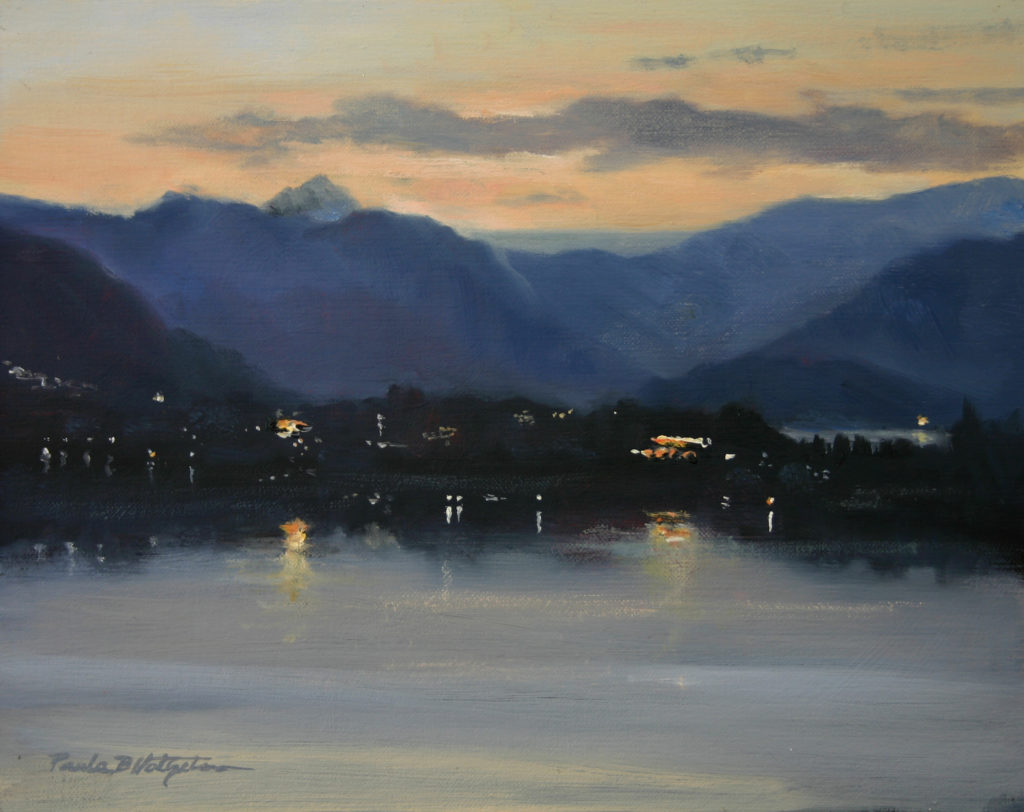
IMMERSED IN NATURE
Given her involvement in so many organizations, it is fortunate that Holtzclaw loves to travel. “Always on the lookout, I notice painting compositions everywhere,” she says. “My favorite subjects — bodies of water, boats, and magnificent skies — rarely contain figures. I prefer painting coastal marine and landscape areas that are still untouched by man, knowing that this is becoming ever more impossible. For at least a while longer, it can be recorded on canvas. I enjoy plein air painting for the sheer enjoyment of being outside and seeing the subject as it truly is.” The painting Underway resulted from a Plein Air Painters of the Southeast event in Darien, Georgia, which Holtzclaw describes as “a wonderful little fishing town with old boats and rugged half-dilapidated piers — a painter’s paradise.”
The approach Holtzclaw has developed over the years reflects the influence of both the Hudson River School (particularly Albert Bierstadt) and the Tonalists, especially George Inness. Whether they depict the Hudson, Alps, Rockies, or Yosemite, Bierstadt’s paintings appeal to her through their luminous skies and distinctive light and also because he wanted to see such unspoiled regions preserved.
Inspired by how Bierstadt and his peers impacted the emergence of environmental protections, Holtzclaw feels that “as artists, we have at least some obligation to future generations to document natural areas that are disappearing so rapidly.”
For Holtzclaw, Inness offers another dimension with his emphasis on imagination and feeling, rather than just objective rendering of the subject. He himself was influenced by the theologian, scientist, philosopher, and mystic Emanuel Swedenborg (1688–1772), who taught that every object has a deeper significance. This approach helped Inness unite what he saw in the material world with his desire for spiritual expressiveness.
Holtzclaw views Inness as a transcriber of nature in its more tranquil aspects, and is inspired by his focusing less “on the specific location than on evoking a mood, emotion, or memory. His muted colors and soft contours foster a contemplative atmosphere that is restful to the eye and soul.” Holtzclaw achieved this effect herself with “Delta Twilight,” which hung in the AWA-sponsored exhibition at the Haggin Museum last autumn.
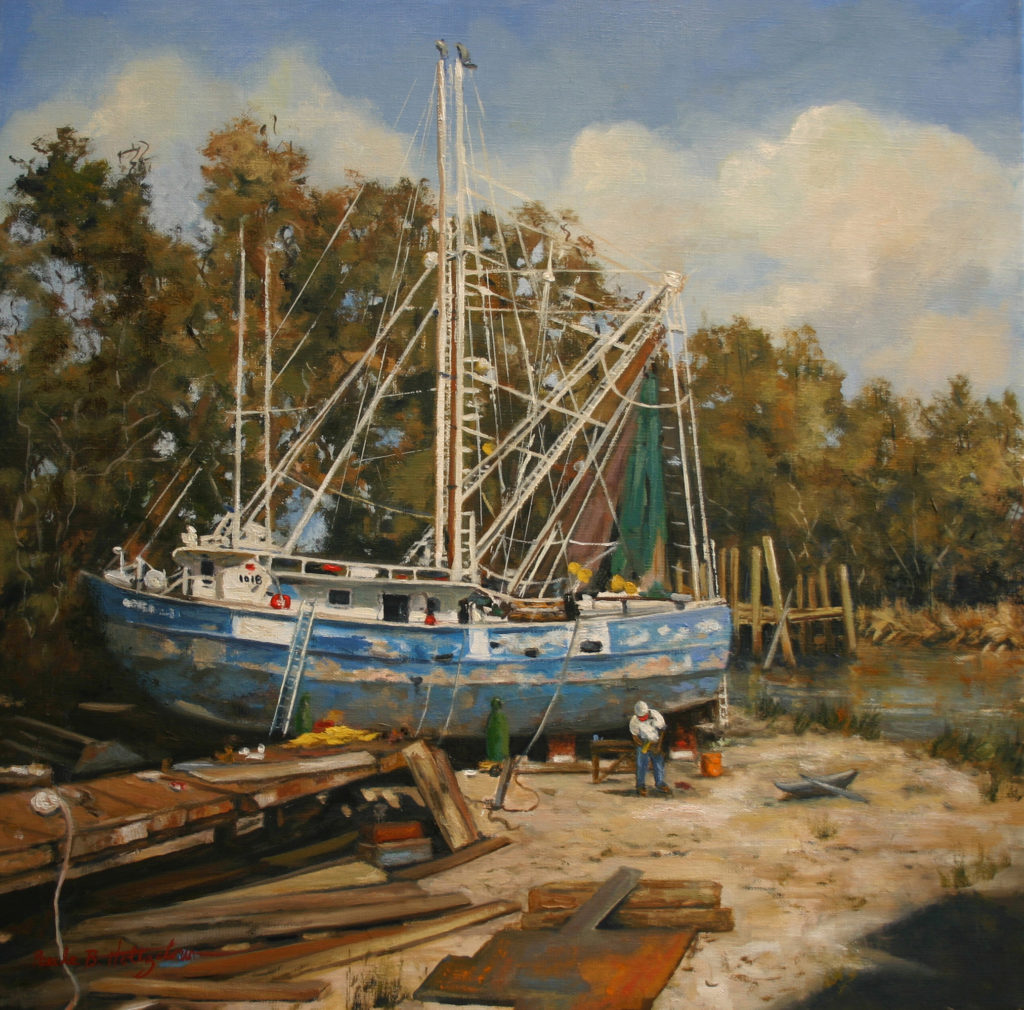
A NAUTICAL BENT
Holtzclaw’s father, Robert Manning Brand, was steeped in the sea. She notes, “Like all members of the ‘Greatest Generation,’ my Dad had a strong sense of patriotism and a love for all things military. I’m sure I inherited a love of water from him. He bought a small boat and took us out often to fish, water ski, or putt around. I lost count of how many times he brought us to Wilmington to see the USS North Carolina.”
Holtzclaw’s father served in the Pacific during World War II and was aboard the USS Damon M. Cummings 643 on Easter Sunday 1945, when the 82-day invasion of Okinawa began.
The maritime influence continued when the artist married Chuck Holtzclaw, who once worked aboard a Norwegian freighter, then became a quartermaster and member of the Mobile Inshore Undersea Warfare unit of the U.S. Navy. “Somehow it all ties in,” she muses. “I feel most peaceful and relaxed near the water, and just love being on or near it. Hopefully I transfer some of that to the canvas.”
Given this nautical bent, it is no wonder Holtzclaw joined the American Society of Marine Artists (ASMA), especially after learning that two artists she greatly admires, Don Demers and William Davis, are ASMA Fellows.
“Just maybe some of their magical ‘artistic dust’ will rub off on me,” she laughs. “ASMA has afforded me the opportunity to show my art in museums across the country and to meet other outstanding artists in the genre.”
Holtzclaw’s career advice for younger artists is based on her own experience. “If you truly love art, pursue it. Don’t let ‘no’ or setbacks discourage you. Choose a couple of the best artists you admire and study with them in any way you can. Paint or draw as often as possible. Practice, practice, practice! As simple as that advice is, it really does work!”
Holtzclaw might well have added that every artist must follow his or her own vibrancy, a strategy that has served her well.
See more paintings by Paula Holtzclaw and connect with the artist at www.paulabholtzclawfineart.com.
CHARLES RASKOB ROBINSON is an author, contributing writer to Fine Art Connoisseur, and Fellow of the American Society of Marine Artists, the nation’s oldest and largest not-for-profit organization dedicated to marine art and history.
> Sign up to receive Fine Art Today, our free weekly e-newsletter
> Click here to subscribe to Fine Art Connoisseur magazine, so you never miss an issue

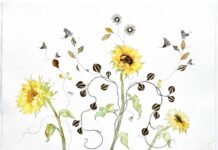

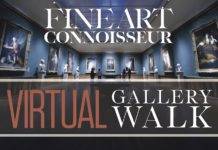




Great article about an amazing lady.